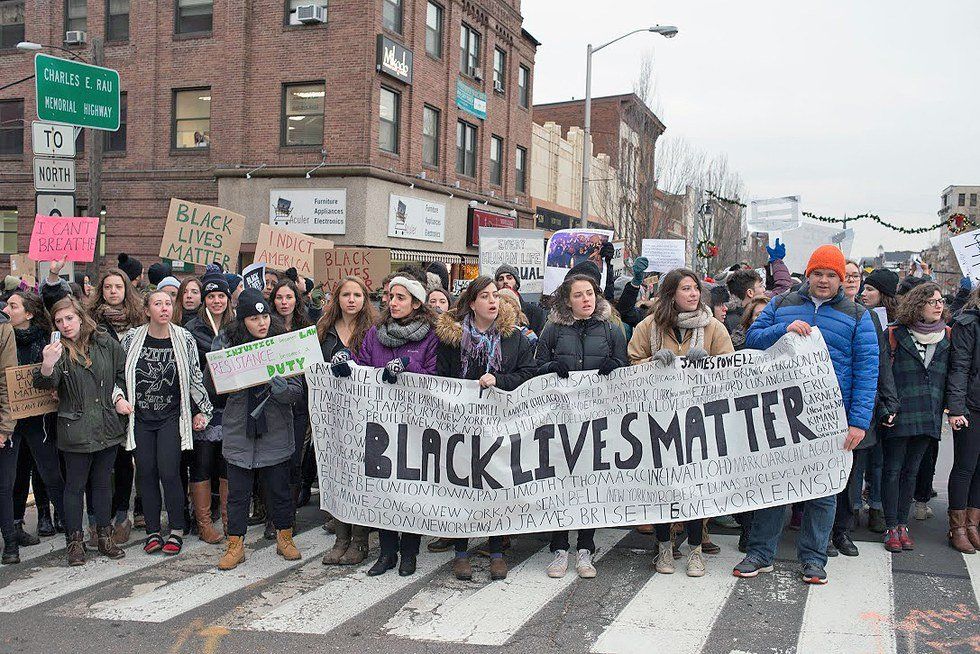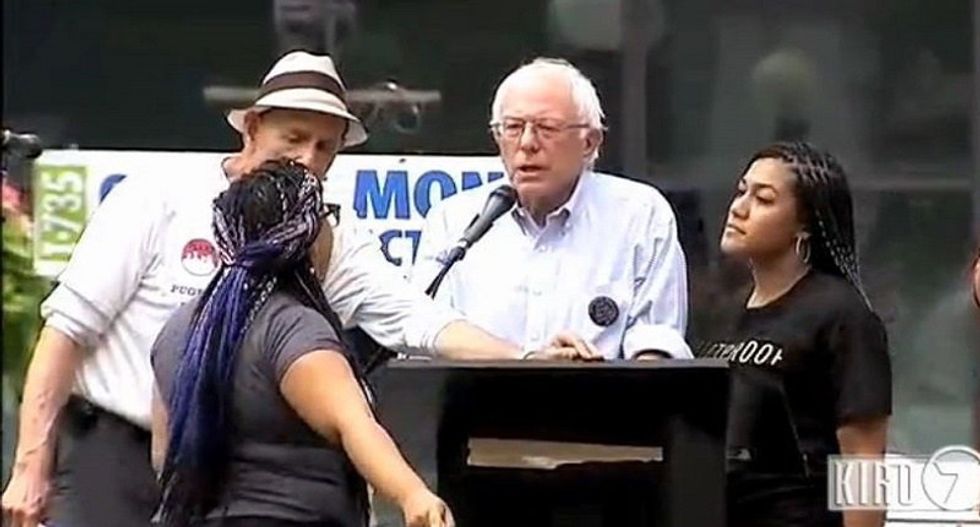2015 was the year the Black Lives Matter movement made its voice heard. Now, in the wake of a grand jury refusing to indict two Cleveland police officers for the shooting of 12 year old boy for the crime of playing with a toy gun, it's clear that the movement won’t be disappearing anytime soon - nor should it. I’m not here to write about the Black Lives Movement itself, because I’ve seen too many abysmal failures from people far more educated in the issue than myself. Instead, I want to write about something I’m a bit more familiar with: the act of watching all of this from a passive, white perspective.
I don’t call myself a true ally, because I don’t deserve that credit. On December 9, 2014, I marched with 1,000 other students chanting phrases like “Don’t Shoot” and “I Can’t Breathe,” the now-infamous last words of Michael Brown and Eric Garner, respectively. I was there because, at the time, it seemed like the right thing to do, and because people I respected seemed passionate about the issue. We marched, and formed a ring around Main Street in Middletown, CT, and gave solidarity by showing that we cared, then we went about our day as usual. From that point on, I called myself a supporter of Black Lives Matter, but also maintained my support in the most detached ways possible. My main line of reasoning was, "Well, if there’s more police accountability, isn’t that good for all of us?" And that was more or less the extent to which I engaged with the issue.
I drew a line, however, whenever I was required to confront my own privilege. In the past year the phrase “check your privilege” has been weirdly distorted to make victims out of a majority. Some have used it to assert themselves as the victim of persecution from masses of faceless enemies (affectionately termed Social Justice Warriors), while others have proudly made it their cross to bear, martyring themselves as beholders of “white guilt”. One of the things I’ve come to realize over the past year, is that accepting one’s own privilege really has nothing to do with guilt, but everything to do with pride. We’d all like to believe that where we stand today is entirely due to our own merit, which is why so many people take any mention of privilege as a deeply personal insult. I felt like I’d worked hard my entire life, and that I’d overcome my own share of deeply personal obstacles, and therefore any assertion that I had somehow benefited from institutionalized racism was basically a claim that I didn’t deserve to be where I was.
But that really isn’t what privilege means. I’ll never known what it’s like to be stopped by police purely because I don’t belong in a certain part of town. I’ll never know the alienation of writing for a college newspaper, knowing that every member of the white editorial staff looks at me as a colored novelty. People will never ask to run their fingers through my hair, like it’s some portal to an exotic locale. I’ll never have to deal with any of this precisely because I’m white, and if I’m placed in a room with someone whom has gone through the exact same upbringing and education, but has dark skin, every facet of American authority will still look at me with the friendly glint of the eye that says “he’s one of us”.
I wish that I realized this on my own, or that I had some scene out of an Oscar-winning movie wherein I toured a poor neighborhood and had my noble heart stirred by injustice I witnessed, transforming me into a beacon of white hope. But that’s not how the world works. What really happened was that a very dear friend called mine out on my bullsh*t and steered me straight. I told him that I thought race could selectively be used in an argument like a trump card, and he pretty much told me I was an idiot. He made me realize that if you’re black, you’re always going to be black, and you don’t have a choice of when that becomes a defining issue. You don’t need to use your race to separate yourself from the heard, because the institutions of American law and economics have already decided when to remind you that you stand as “the other.”
Ironically, the moment that made me vastly re-think my stance on Black Lives Matter was the interruption of Bernie Sander’s speech, an event which turned so many other “liberal-minded” people against the movement. Now, with previous BLM events, the online reception would reliably be split between cheap displays of solidarity, and racism so ugly it would make you want to spend the rest of your life in mountainous seclusion. But with the Bernie Sanders incident, there was a third category of people who were all for civil disobedience, until it offended their definition of civility. One of the prevailing attitudes fell under the lines of “Why can’t you people see that Bernie is trying to help you?”, a basic assumption that because he was the most left-wing presidential candidate, he inherently had their best interests at heart. The other complaint, and one which recurred in BLM movements throughout the year, is one that asks “How do you people expect to make people sympathetic to your beliefs, when you act so extreme?” The common denominator of these two reactions, is an anger that BLM has somehow bit the hand that feeds it. It's an affection towards the movement that comes with the condition that it remains out of sight and out of mind. But once Black Lives Matter over-steps its boundaries, and interrupts things that liberal-minded people like, you really start to see the ugliness of privilege.
I’ve realized I needed to radically re-evaluate my relation to the movement, because my own approach hasn’t been that different. Up until this point, I’ve stubbornly held onto the presumption that BLM needed to somehow deliver their message in a way I could find palatable when, in reality, I wasn’t owed a damned thing. I think that Black Lives Matter is something to be reckoned with, rather than understood. The protesters’ only responsibility is to themselves, because their movement is the unanimous scream of millions, who have had to deal with police, politicians, and the status-quo condescendingly patting them on the head one moment, then kicking them in the ass the next.
You might find it tedious when their protests enter your library, or block the flow of traffic, but honestly, that’s too bad. During the 1965 Selma to Montgomery marches, there were probably good, tolerant people who were late to work because the protests were blocking the road; as it turns out, history doesn’t care about their side of the story. Looking forward to this new year, I don’t want to keep acting like a passive benefactor. I won't trivialize this decision by calling it a New Years Resolution, but I do know that when 2017 rolls around, I want to be able to look back at this year and proudly say that I stood for something worth fighting for.
I'm still figuring out what that actually entails, since being a white ally requires a mix of being informed, showing receptive support, and knowing when to shut the hell up. But in the mean time, I do solemnly swear that if I’m in earshot of somebody who's still trying to make “All Lives Matter” a thing, I'll promptly tell them that they sound like a complete and utter twit.

























